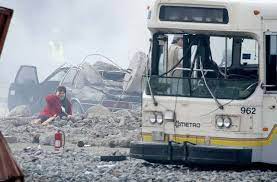Careless threats: On the Ukraine war and the dirty-bomb talk
The war in Ukraine is threatening to escalate beyond anyone’s control
Russia’s allegation that Ukraine was planning to launch a so-called dirty bomb shows how dramatically the Ukraine conflict has escalated. Russia’s Defence Minister Sergei Shoigu held talks with many of his global counterparts, including Rajnath Singh, accusing Ukraine of potential “nuclear terrorism”. A dirty bomb is not a nuclear bomb but a conventional explosive device with radioactive materials, the explosion of which could turn swathes of land uninhabitable for decades. Ukraine and its western backers have rejected the Russian allegations, saying the Russians, who have suffered setbacks, are making unfounded claims for a false flag attack. It is difficult to ascertain what is going on behind the fog of a full-scale war, but the talk of dirty bombs and nuclear terrorism does not bode well. Ever since the U.S.’s nuclear bombing of Japan in 1945, the world has largely treated the nuclear option as taboo. Even in 1962, when the Soviet Union and the U.S. were on the brink of conflict, their leaders managed to end the crisis amicably through dialogue. But unfortunately, Vladimir Putin’s threat of using all means available to him to protect his country and Joe Biden’s warning of a “nuclear Armageddon ” are tantamount to normalising the nuclear option in the middle of a conflict that is in an escalatory spiral.
What is more surprising is that even as the war is steadily deteriorating, there is no conscious effort by any side to start a dialogue. Russia says it is ready for talks but has not given any concrete proposals, and its offer for talks cannot be trusted, especially after it announced the annexation of four partially controlled Ukrainian regions. Ukraine says it will not hold talks with Russia as long as Mr. Putin is in power and that it intends to fight till all Ukrainian regions are liberated, including Crimea. Ukraine’s western backers say they would continue to support Ukraine’s resistance “as long as it takes”. As all sides take maximalist positions, escalation is creating its own dynamic, taking the whole world hostage. Eight months of war have already created economic and humanitarian disasters. And there are greater fears of a direct conflict between Russia and NATO, two nuclear forces. What more do the stakeholders of this war want before they actually begin serious talks? They should realise that unchecked escalation with an open possibility of a Russia-NATO war would be catastrophic for the whole world. The stakes are higher than their geopolitical goals. The rhetoric on nuclear attacks and retaliation should stop immediately and Russia, Ukraine and the West should begin talks to end the conflict. The alternative would be cataclysmic.
